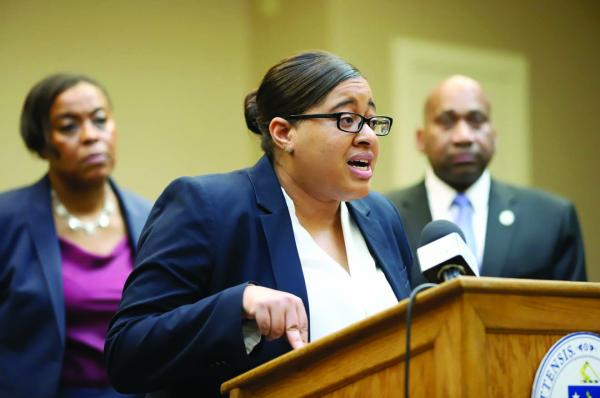March 28, 2019

Rep. Chynah Tyler of Roxbury said Department of Correction policy changes are the “first step in the right direction.” Sam Doran/SHNS photo
Recent changes to the visitor policy at state prisons will help inmates maintain the types of family and community ties that can aid their rehabilitation, members of the Black and Latino Legislative Caucus said last week.
Supporting loved ones who are incarcerated is an investment, and oftentimes even more of an investment for low-income families and for families of color, and we are committed to creating an environment where those who are incarcerated can learn, grow, and heal,” Rep. Chynah Tyler, a Roxbury Democrat, said at a press conference the caucus held to tout the policy revisions.
“Allowing for those who are incarcerated in the Department of Correction right here in the commonwealth of Massachusetts to update the authorized, pre-approved visitation list every 120 days is the first step in the right direction in creating a strong, long-lasting support system for those who are and who have been incarcerated,” Tyler said.
Policy changes that took effect on March 1, as outlined in a memo from Commissioner of Correction Carol Mici, raised the upper limit of pre-approved visitors for maximum security inmates from five to eight, and allowed inmates to revise their visitor lists every 120 days.
Previously, inmates could only update their list of pre-approved visitors twice a year, according to the caucus.
“Some may say that this is a small, little change, but we think it’s incremental change that says a lot of how we can impact rehabilitation,” said Rep. Carlos Gonzalez, who chairs the caucus. “And the key to this is that it’s a joint effort looking at ways to improve the ability to rehabilitate folks that are incarcerated.”
Black and Hispanic inmates make up about half the department’s prison population, the caucus said.
Gonzalez, a Springfield Democrat, said the visitation policy is not solely an issue of importance to the black and Latino community. The change is about respecting the rights of everyone within the prison system, he said.
Mici, in a statement distributed by the caucus, said the update “will offer additional visiting privileges to inmates while still maintaining our commitment to ensuring the safety of all public, staff, visitors, and inmates throughout the Massachusetts Department of Correction.”
“The Department recognizes the importance visitors have on an inmate’s well-being and successful reentry into the community, and on the encouragement on family reunification,” she said.
Legislation filed by Sen. Sonia Chang-Diaz, a member of the Black and Latino Caucus, and Rep. Marjorie Decker calls for further changes to DOC visitation policies. Among other measures, the bill (S 1379/H 2047) would prohibit “placing limitations on the number of unique individuals who may be eligible to visit the inmate.”
Elizabeth Matos, executive director of Prisoners’ Legal Services of Massachusetts, said her organization hopes “there are more changes to come. For those on the inside who have large immediate families, they’re still not able to see a lot of those people, because the caps are still fairly low, so I think that is one area that the department is sympathetic to, and we’re very happy to do what we can to facilitate those conversations,” she said.
The department allows exceptions to its visitor cap in certain circumstances where an inmate’s number of immediate family members exceeds the cap.


